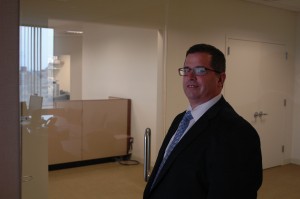
Interim chief financial officers are emerging as new “business tools” that companies are tapping to help them grow.
“The advent of the interim CFO is directly related to the economy,” said David Lewis, founder and president of Operations Inc., a human resources consulting firm in Stamford. “I see more of these guys now than ever before the economy went bad. These are smart, well-qualified people doing good business out there because they see a need.”
Lewis said the trend toward outsourced CFO positions is one that has been made through necessity.
“If you look at the histories of the professionals doing this, they all come to this world from being fulltime CFOs for businesses,” Lewis said. “They are tried and true in their position and are serving in many cases as a great tool for businesses who find themselves in a hard spot.”
After a hiatus, Darien-based Start U Up reinitiated it services of offering CFO and human resources consulting services. The company, which had offered services from 2004 to 2008, recently opened up its operations again after founder Jeffrey Glick left a CFO position at Sagard Capital in Greenwich.
“I think many small or emerging business people are very frustrated,” said Glick, whose business specializes in providing consulting services to hedge funds and private equity companies. “Today it”™s just harder to run a business.”
Glick said the “damned if you do, damned if you don”™t” scenario is something that is becoming more and more common for businesses that are at the tipping point of expansion. He said his business is thriving.
Lewis said in this climate more and more of a typical CFO”™s responsibilities are falling on the chief executives. He said the scenario of bookkeepers serving as CFOs and finding themselves underwater is becoming more and more common.
“A typical scenario today is an operating company is thinking of scaling up, but their internal controls and their internal infrastructure aren”™t allowing the business owner to go out and market and devise a strategy,” Glick said. “They typically have their fingers in the dike.”
For many businesses, Glick said, a lot of time is being spent managing the business and there”™s none left to grow it.
“Many businesses need, but cannot afford, an added layer of management between the chief executive and their office, a true CFO,” Glick said. The cost versus value equation makes a specialized consultant service attractive, he said.
“It”™s about figuring out how to get from point A to point B. That can be a difficult journey if you”™ve never done it before.”
Glick said the goals of an interim or consulting CFO are to put in the management tools in the hands of the business owner and get them where they want to be.
“There”™s a big difference between bookkeeping and the functions of a CFO,” Lewis said. “At some point you need more sophisticated leadership to handle your financial future and applications. In many cases the job has simply gotten too big.”
Glick said having access to accurate and well-reported financial controls is often what a business owner needs to get to the next step.
“With that information you can make a decisions based on specifics, which is the criteria that can really allow a business to flourish,” Glick said. “Banks want to get a very detailed picture of what your internal infrastructure looks like.” He said without the ability to offer a clear picture to banks, lines of credit are rarely issued.
“Banks are spending more time with their clients because they are a true partner,” Glick said. “Today there”™s more transparency needed for operating companies and more questions needed to be answered right away not in a few weeks.”
Lewis said when executive financial decisions become more complicated and things like acquisitions and creative accounting come along a business has to evaluate its options.
“It”™s a good niche and there is a lot of traction out there,” Lewis said.


















